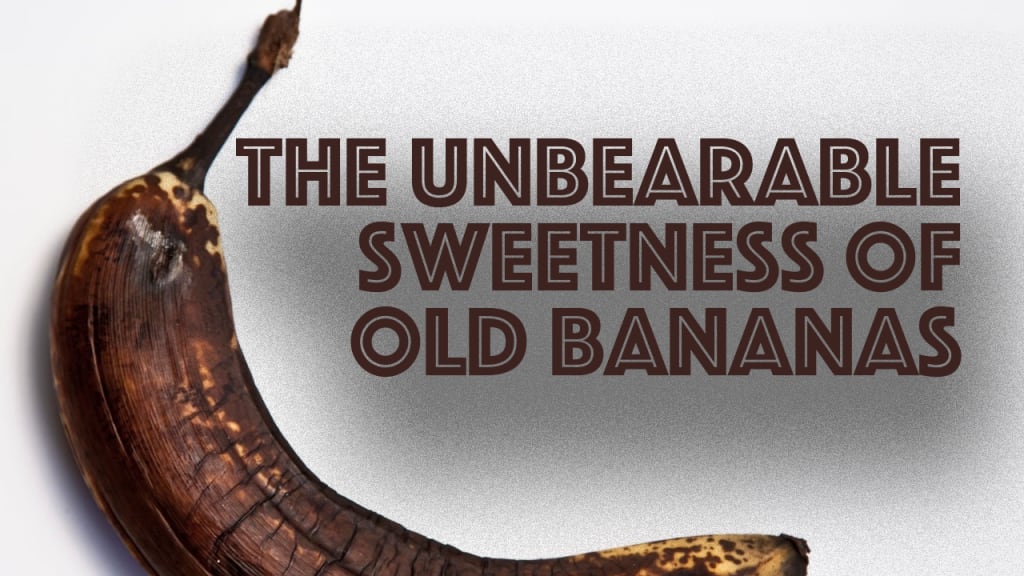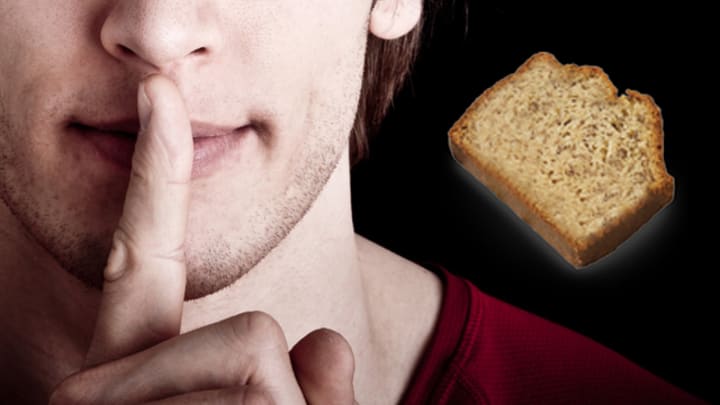The Unbearable Sweetness of Old Bananas
And what they have to teach us about summer.

There’s a secret to good banana bread. As it happens, it’s the same as the secret to a good summer. We’ll get there.
First, though, we need to get one thing straight: A banana is a berry.
Like all berries, a banana exists to be eaten. In being scarfed, swallowed, and processed through some critter’s digestive tract, the banana spreads seeds and leads to more bananas. This is how the banana perpetuates itself indefinitely.
So it goes.
So, functionally, a banana’s job is to be as delicious as possible in the eyes of as many creatures as it can. More delicious, more eating, more bananas. And although our modern varieties (for the most part) are bread to ditch the seeds of their ancient Australian cousins, they do retain this one, obvious holdover from that evolutionary imperative: they’re sweet as all hell.
This much is true for plenty of berries. They’re all built for eating. Many of them are sweet. But bananas, unlike some berries we could mention, hold the special appeal of continuing to ripen (and sweeten) long after being dropped, knocked down, blown off the tree, or picked. They just keep on getting more delicious. Starches in the fruit breakdown into sugars. The flavor deepens and sweetens.
Thus, like pickles or a leather jacket, the elderly banana is a definitive proof that some things get better with age.
But, as with all life, there is eventually a point of no return. Yes, the aged banana is sweeter and more sugar-dense. In the eyes of a less discerning eater (say, an ape, or a small lizard) that’s a clear plus. But for the spoiled and choosy modern human, blessed with no end to the sugar options, it sometimes gets to be too much. On some woebegotten morning, we inevitably find our once delicious banana simply no longer appealing. A terrifying, unseemly thing—blackened, browned, made mushy by the ravages of time. Maybe with a cloud of fruit flies already enjoying its oncoming demise. No longer joyful. No longer appetizing.
Time to throw it out? It certainly would be, were it not for our humble hero. Enter: banana bread.
Banana bread is the elderly banana’s redemption: a final, delicious metamorphosis at the end of a long life. Which makes banana bread not only the perfect summer food, but also, as we grow older, the perfect summer metaphor.
Bananas are nostalgia—slowly candied, but eventually too soft, too unpleasant, too packed with sweetness. Banana bread is the wisdom of experience—a way to appreciate that richness without succumbing to it.
Like the decrepit fruit that gives its flavor, and like summer itself, the banana bread experience changes over time. As we age, like a banana, it is rarely, if ever, perfect.
Summer is sweet. In many ways, it’s too sweet…particularly as a child, when days away from school mean, for many of us, an abundance of ice cream, sunburns, reckless endangerment, and (perhaps later on) reckless romance. It’s a time for all things good. It’s a respite from the grind of maturation, of growth, of constant learning. It’s also a finite time, made all the more important by its ever looming end. We know, even as the final bell rings, that we will soon be shopping for new pencils and new notebooks. It’s fleeting. Summer should be consumed. Enjoyed. Lived fully. Eaten up.
And for many of us, even as we age into a world of emails and work, of lost friendships and late debts, we harbor a secret longing for those old summers—a longing we don’t even necessarily acknowledge fully, unless in a cursory, half-joking, rye-smile type way among old friends.
Slowly, as the years pass, our experience of summer days morphs into a more nostalgic experience: although the patios and the parks still bring joy, they can’t quite touch the memory of carefree months spent in utter bliss. Those memories sit, untouched, in the back of our minds. Resting, like forgotten bananas, ripening at the back of a drawer. They get sweeter, more appealing…until, one day, when the working world has chewed us up, we realize it’s too much. What was sweet and light becomes overpowering. Nostalgia becomes painful.
What do we do with that old rotten banana, the summer that no longer matches the ecstasy of childhood?
Banana bread teaches us to take things as they are: to find the value and the joy in savouring what’s left. The bananas may have changed. They’ll never be what they were. But with love, with patience, with an appreciation for what we have, they can become something altogether more.
All of which leads us to the secret of both great banana bread, and great summers.

OK, it's not what you think. It’s not really old bananas—despite what we just discussed. Everyone knows you need the frozen, forgotten kind from the back of your freezer. That’s no secret anymore. And for what it’s worth, the secret also certainly isn’t mayonnaise, as some of the more horrifying heathens on Google like to pretend. Adding mayo is, if anything, an atrocity on par with raw eggs in your white wine, or dead worms in your spaghetti. Not good. Not delicious.
No, the secret to really excellent banana bread is both simple, and classic. And although this recipe is a closely guarded secret (something many, many would-be banana bakers spend lifetimes perfecting), here I will divulge the truth:
Here we go:
1. Be 7 years old.
It should be, ideally, the summer after grade 2. This is imperative. It’s crucial you be mature enough to remember the sensations vividly—every soft bite (layered with butter, of course) and every crunch of salt and chocolate. The sweet, wafting smell, a hint of vanilla, floating above the crust. The bitter temptation of waiting for your grandmother, Nani, to cut into it—knowing the result is worth it, but lacking that all-too-adult skill of delayed gratification. It’s equally essential, though, that you not be too old. In later years, your mind clouded and jaded by more sickly sweet delights like Monster Energy Drinks, the moment will not stretch into infinity in quite the same way. Sadly, like so many things, the magic just doesn’t last forever.
2. Go to Nani's house in the country.
You know the one. The big old blue farmhouse with the faded paint, nestled under Mount Owls Head in Quebec’s Eastern Townships. If you want to get technical, it’s actually considered necessary that you drive to Mount Owls Head, in Quebec’s Eastern Townships, from Toronto, Ontario, in a muggy, dilapidated old Honda Odyssey. During the drive, books on tape (Harry Potter, Roald Dahl, BLANK) are optional, but strongly encouraged.
3. Attend the wedding reception for your Mum's second marriage to your fun, kind, and loving new step-dad.
(This is most important, so read carefully)
You’ll need to be surrounded by your small, laughing, joyous family, at the reception for your angelic mother's second marriage. If you want the PERFECT banana bread, this step is absolutely unskippable.
You won’t understand the full weight of the event, naturally, and you won’t really know what the big joke is—why you’ve never seen Nani smile so much, or your older sister look so radiantly joyful. You won’t know why it’s considered so essential that your ridiculous, oversized dress shirt and toy store bowtie remain done up throughout the entire service. Or why BLANK when you drop the ring. You will, however, recognize the pure bliss in the face of your tired, overworked, recently-single mother as she slices into a perfectly soft, perfectly buttery, homemade loaf.
That is how you craft a perfect banana bread experience. A perfect summer experience.
At least in my experience…
No good? OK, here's the truth:
Those are my memories: the small, sepia-tinted bits of wonder that crop up both when I reflect on a coming summer, and when I lay eyes on an alluring, plastic-wrapped loaf of doughy goodness at my local café. Your mileage may vary.
And the reality is, though I remember it as perfect, I'll never experience that again.
Not only that, but every time I bring the memory back, every time I try to live in that moment again, it's both sweeter and less satisfying. Because nostalgia hurts. And because every second we fly farther from the past. And in any case, was it really perfect? What's so sweet about the summers of our past? Is an experience, without prior experience, as valuable?
To eat dessert as a child is to revel in immediate gratification and the pleasure of a taste that will surely never end.
To eat dessert as an adult is an altogether more complicated experience. There’s comparison: how does this particular desert stack up against the many deserts of my life? Then there’s the lovely and somewhat distracting feeling of nagging guilt, as you can’t help but wonder how so much fat and sugar will mastastisize inside you. And finally, there’s an added appreciation: an understanding that in a wide and endless universe, in an uphill struggle to find moments of bliss against the backdrop of constant challenges, we still have ice cream. We have those solitary experiences of genuine wonder at flavors both exciting and nostalgic. I have, in my own experience, banana bread. Made all the more sweeter by a growing understanding that life, the universe, and bananas, are finite.
All things must end.
So, there we have it. The true, painful, cheesy, and undeniable secret: it's all about making new memories. About new opportunities. A summer is only a summer when we give ourselves up to the moment—when we fully appreciate the sheer miracle of one brilliant moment in a vast, chaotic universe.
Ditto for banana bread. Add butter, add salt. Try it with nuts. Try it with chocolate. Just try it. Find your own path. Revel in the memories of old flavors, but never stop experimenting. Never stop learning, and growing, and striving for that perfect loaf. Then you can never go wrong.
Unless you include mayo. That's a mistake no matter how you slice it.
About the Creator
Reid Kerr-Keller
The world is strange and funny and fascinating. I try to write stories that do it justice.






Comments
There are no comments for this story
Be the first to respond and start the conversation.